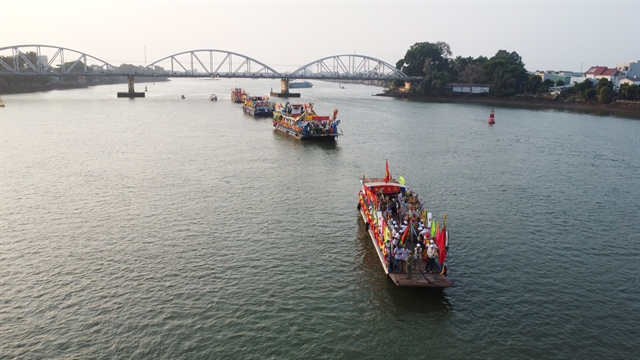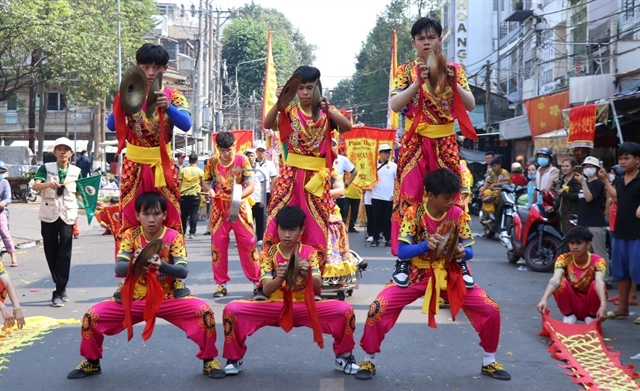
TRADITIONAL RITUAL: The Ông Temple Festival’s procession ritual on the Đồng Nai River. VNA/VNS Photo Công Thanh
The southern province of Đồng Nai has launched a cultural development project for 2024.
The project aims to build a healthy cultural environment, preserve and promote cultural heritage, art and literature, accelerate digital transformation, and boost cultural exchange with other localities and countries.
Under the project, the province will prepare dossiers to seek recognition for worshipping ceremonies for peace at Nguyễn Hữu Cảnh Temple and Tổ Sư Temple in Biên Hoà City as national intangible cultural heritage.
Nguyễn Hữu Cảnh Temple in Bửu Hoà Ward was built in the 18th century to honour Marquis Nguyễn Hữu Cảnh (1650-1700), who established territorial sovereignty over the southern region for Việt Nam.
In 1698, Cảnh was dispatched by the Nguyễn rulers to extend the country's southern borders and establish Gia Định, now part of HCM City. He later encouraged people from the central region to move southwards and to settle down in the new land, and ordered the construction of roads, canals and markets.
The worshipping ceremony is annually held on 15th-16th days of the fifth lunar month to show gratitude for Cảnh’s great services to the nation, as well as to remind young generations to preserve and promote national traditions.
In 1991, the temple was recognised as a national historical heritage site by the Ministry of Culture, Sports and Tourism.
Meanwhile, the ceremony at Tổ Sư Temple, known as the Lady Thiên Hậu Temple, in Bửu Long Ward in Biên Hoà City takes place on 10th-13th of the sixth lunar month every three years.
The event is celebrated by the ethnic Hoa people (Chinese-born Vietnamese) to pray for peace, attracting thousands of pilgrims and visitors.
The work seeking recognition for the two temples is expected to finish before the 330th anniversary of the founding of the province in 2028.
According to Nguyễn Hồng Ân, deputy director of the province’s Department of Culture, Sports and Tourism, Đồng Nai has advantages with heritage tourism, and the application of digital technology to bring better experiences to visitors.
The province is building a 3D virtual tour of the Trấn Biên Temple of Literature, Cự Thạch Ancient Stone Tomb, Tân Triều grapefruit orchards, Cát Tiên National Park, the Đồng Nai Cultural and Natural Conservation Zone, and the Amazing Bay water park.

CELEBRATING HERITAGE: Folk music and dance is performed on the streets of Biên Hoà City during the Ông Temple Festival. VNA/VNS Photo Công Thanh
Last month, the province hosted the Ông Temple Festival, its first cultural tradition to be recognised as a National Intangible Heritage in 2023.
The festival was held on February 19-22, to show gratitude to ancestors who established and developed the land of Biên Hoà Đồng Nai.
It offered various rituals and activities such as a procession in downtown Biên Hoà City and along the Đồng Nai River, a release of floating lanterns, a martial arts performance, and folk games and music.
The festival attracted visitors from neighbouring provinces, and countries such as China, Thailand, Singapore, Malaysia, and Indonesia.
The Ông Temple in Hiệp Hoà Ward was named a national architectural heritage in 2001. VNS
OVietnam